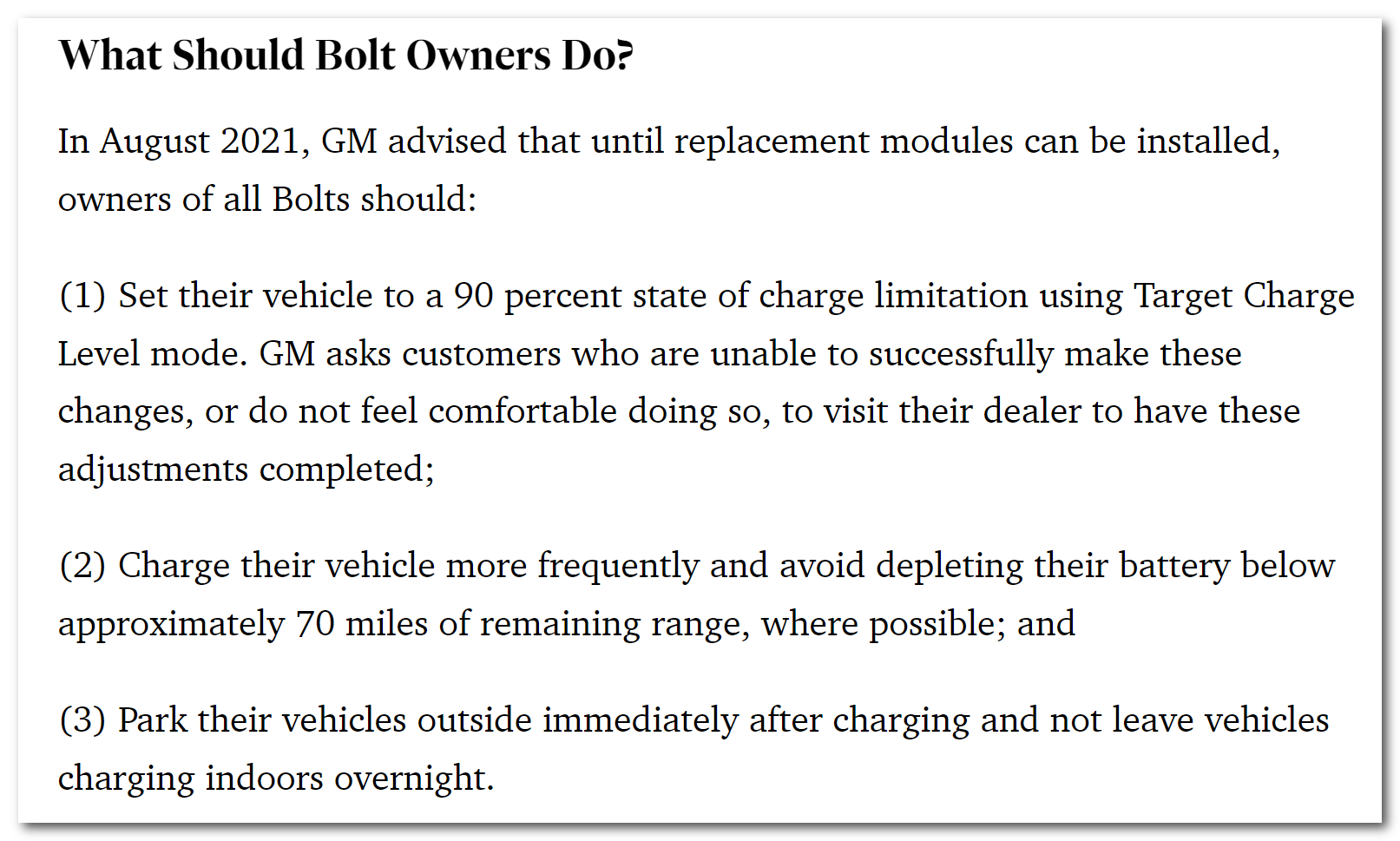bracconiere
Jolly Alcoholic - In Remembrance 2023
thanks for the viewing suggestion.

i did have my usual thought watching it though, this just seems like people that don't want to get blood on their own hands.....


Cellulose ethanol is a thing, it's just harder and more expensive to make than the stuff from from corn grain.
Bolts are going through a thing. A problem developed with 9 hundredths of a percent of Bolt batteries, so they've halted production while they replace all the batteries in a recall.

i'm betting you ethanol is the future, not electric...
Cattle are supposed to eat grass, not corn or it’s remnants.If it's that difficult to get energy out of something with fairly simple carbohydrates, how difficult would it be to get energy out of cellulose.
Corn stalks have a variety of uses. In a lot of dairy &/or beef operations they're chopped up with the corn, go through anaerobic fermentation, and are fed to the cattle.
They're also made into round bales. On my family's farm, we'd mostly use these for cattle bedding. When we'd run short of silage in the late summer, and if the previous year's bales were still in good shape, we'd occasionally just put a bale in the feeder every few days and they'd eat those, stretching our supply of silage.



![Craft A Brew - Safale S-04 Dry Yeast - Fermentis - English Ale Dry Yeast - For English and American Ales and Hard Apple Ciders - Ingredients for Home Brewing - Beer Making Supplies - [1 Pack]](https://m.media-amazon.com/images/I/41fVGNh6JfL._SL500_.jpg)









nuclear. So much depends on it, from powering our cities to powering space travel. That's where we need the breakthroughs. Just a safe little nuclear-powered sterling engine in the trunk.
Cattle are supposed to eat grass, not corn or it’s remnants.
Yea, the remedy for current owners isn't pretty, but not as bad as risking a house fire.
your hands aren't blood free, and there's significant loss transmit the electrons over distance....
Someone hasn’t been doing his homework.

EV’s are not as clean as you’d hope, but the MPG equivalence of using coal to generate and then charge an EV is still leaps and bounds ahead of burning gas in your car. The bigger question is the cleanliness of mining/processing and the recycling/disposing of the metals used to manufacture batteries. I’m not yet convinced that batteries are the ultimate answer. I wouldn’t count hydrogen fuel cells out just yet, especially for Aviation/Railway/Shipping/Trucking applications where supply infrastructure would be easier to establish.maybe not...just someone that is dreading having to plug my car in to go to the store......i don't even like it when i have to charge my battery, because i haven't driven in a few weeks...to get the thing to start..
and if you look at that PDF, most of kent's power is generated, by burning coal...to turn a electric motor, generates power...and then he FEELs clean because it's electricity now! all good!like the red stuff in a steak is 'juice'...or throwing a crab or lobster in boiling water is just 'clean air escaping them'....

Railway
I hear that argument a lot but just look at the environmental disasters that are caused by drilling for unrenewable oil as well as the geopolitical messes and war it causes. Conversely there isn’t anything in an EV battery that is un-recyclable. Hydrogen’s problem as an energy storage medium is it is half as efficient as just storing and using directly the electricity used to make the H2 in the first place. Not to mention all the other associated problems of high pressure or cryogenic storage, hydrogen embrittlement etc.EV’s are not as clean as you’d hope, but the MPG equivalence of using coal to generate and then charge an EV is still leaps and bounds ahead of burning gas in your car. The bigger question is the cleanliness of mining/processing and the recycling/disposing of the metals used to manufacture batteries. I’m not yet convinced that batteries are the ultimate answer. I wouldn’t count hydrogen fuel cells out just yet, especially for Aviation/Railway/Shipping/Trucking applications where supply infrastructure would be easier to establish.
Nuclear won't go anywhere until they come up with a permanent solution for dealing with the waste. Also, when things go wrong, they go really wrong - Three Mile Island, Fukushima, Chernobyl ...nuclear. So much depends on it, from powering our cities to powering space travel. That's where we need the breakthroughs. Just a safe little nuclear-powered sterling engine in the trunk.

Nuclear won't go anywhere until they come up with a permanent solution for dealing with the waste. Also, when things go wrong, they go really wrong - Three Mile Island, Fukushima, Chernobyl ...
Brew on

Nuclear won't go anywhere until they come up with a permanent solution for dealing with the waste.
Years ago I had a professor who had worked on molten salt reactors. In theory, they look very good, but my prof said that they hadn't been able to develop alloys that would stand up to the molten salt over long periods of time. Has this situation changed?We've known how to make fast neutron reactors since the 50's that are capable of consuming actinides (the really bad stuff with long half lives) and are more fuel efficient. There were at least 20 examples of FNR built and run over the years. Fast spectrum molten salt reactors not only burn down their own waste but can also be fueled with the stockpiles of nuclear waste we have already generated.
There are proven tested ways to produce nuclear power with very little waste, we just need the will to do it.

Years ago I had a professor who had worked on molten salt reactors. In theory, they look very good, but my prof said that they hadn't been able to develop alloys that would stand up to the molten salt over long periods of time. Has this situation changed?
Cattle are supposed to eat grass, not corn or it’s remnants.

Yes, but they don’t feed the grassy part to cows, only the seeds. As soon as I posted I knew someone was likely to bring that up.Corn is a grass, botanically speaking . . .
Yes, but they don’t feed the grassy part to cows, only the seeds.
That RV-EV is just about the coolest thing I've seen in some time, as well as something I've wanted to have for almost as long. SWMBO'd and I are on our third Class B+ sized motorhome and are looking for #4. The first three have been upbuilds from Mercedes Sprinter diesels cutaway chassis and have served us exceedingly well for nearly a quarter of 1,000,000 miles, through all 48 of the contiguous States and 5 Canadian Provinces. At 16 mpg, I could have saved 15,625 gallons of diesel x $3.30/gal = $51,562.50 over the 9 years we've been RVing. Three hundred miles is the maximum we usually target for a day's worth of driving, and virtually everywhere we stop has 50 amp/240V electrical hookup included in the camping fee.
The only thing EVs do is reduce local air pollution. Vehicles are made from so much more than a gasoline tank or a battery. The 'debate' is fundamentally flawed. Private car ownership for all isn't sustainable. If you live in the city you don't need to own a car. Rent one when you do. Private car ownership is all about redundant economics that translate into very little for the vast majority of us.
Yep, that's all they do. Reduce fossil-fuel based air pollution in urban environments. 'EV' is a scam to prop up private car ownership - to profiteer and stuff shareholders silly mainly.They don't just reduce local air pollution. But the big thing I took from this is that we should be improving mass transportation. I can get behind that.